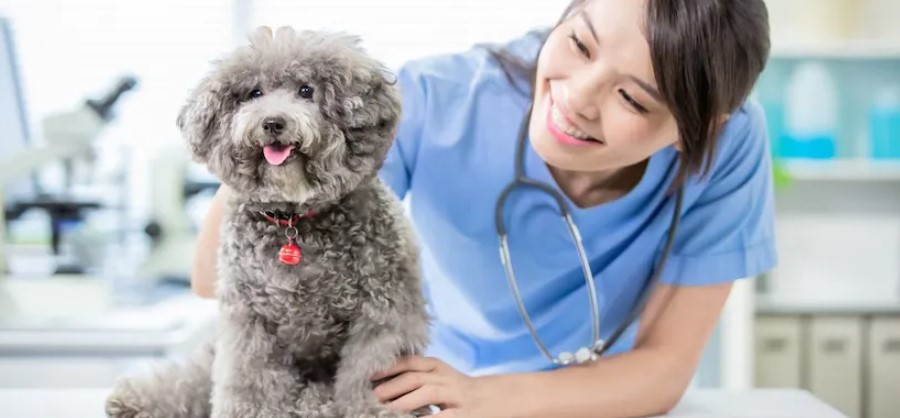As our beloved pets age, they assume an increasingly significant role in our lives. They stand by us unwaveringly, offering constant comfort and affection as our devoted companions. However, just like us, aging pets undergo changes in their needs, demanding more attention. This underscores the critical importance of routine vet visits for senior pets to preserve their health and well-being.
Prioritize Your Pet’s Healthcare — Not the Costs
Explore Pet Insurance Plans
In this article, we’ll delve into the significance of regular vet appointments for senior pets. We’ll commence by delving into the aging process in pets and what you can anticipate during a vet visit. Subsequently, we’ll examine the advantages of routine geriatric examinations and provide guidelines for the frequency of veterinary checkups for older dogs and cats.
Whether you’re a seasoned pet parent or new to the realm of geriatric pet care, you’ll uncover valuable insights to navigate these special years with your furry companion. So, let’s delve into this vital subject.
Table of Contents:
- Understanding the Aging Process in Pets
- When Is a Pet Considered a Senior?
- What to Expect During a Vet Visit for Senior Pets
- 5 Key Benefits of Regular Vet Visits for Older Pets
- How Often Should Older Pets See the Vet?
- The Role of Pet Insurance in Senior Pet Care
- Key Takeaways
Understanding the Aging Process in Pets
Before delving into the specifics of geriatric veterinary care, it’s essential to comprehend when a pet is considered a ‘senior’ and the typical changes you may observe as your pet matures.
When Is a Pet Considered a Senior?
The age at which a pet is considered a senior varies, primarily depending on its size and species. Cats are generally considered seniors at around 10 years old. Senior status in dogs is more complex, as it depends on size, with larger dogs aging more rapidly than smaller breeds. This means some dogs may enter their senior years as early as six to seven years old, while others may not attain “senior” status until they’re over 10.
Cats are considered to be “seniors” around age 10, while some larger dog breeds reach senior status as soon as 6 years old.
Signs of Age in Pets
As pets age, they may exhibit certain changes in their energy levels, behavior, and dietary requirements. They may slow down, opting for leisurely strolls instead of vigorous play, or they might sleep more than usual. Alterations in appetite may necessitate dietary adjustments with specific nutrient compositions tailored to their age. Behavioral changes, including heightened irritability or confusion, can also manifest.
Moreover, senior pets are more susceptible to various health issues. Arthritis, dental disease, heart disease, kidney disease, and cognitive dysfunction (akin to dementia in humans) are some of the common conditions observed in senior pets.
What to Expect During a Vet Visit for Senior Pets
Visiting the vet with a senior pet may differ from appointments with younger pets. As your pet ages, their healthcare requirements change, as do the evaluations and procedures performed by your vet. Here’s a brief overview of what you can anticipate during a geriatric appointment:
- Comprehensive Physical Examination: Your vet will conduct a thorough physical examination encompassing your pet’s eyes, ears, teeth, weight, and listening to their heart and lungs. They will also assess your pet’s abdomen and joints for any irregularities.
- Diagnostic Tests: Depending on the results of the physical examination, your vet may recommend blood work, urinalysis, or even imaging such as X-rays. These tests are used to screen for potential issues that may not be externally visible, such as kidney disease or arthritis.
- Diet, Exercise, and Behavior Discussion: You’ll have the opportunity to discuss any changes in your pet’s behavior, activity levels, and appetite. Your veterinarian may provide advice on dietary modifications or exercise regimens tailored to your senior pet’s needs.
The objective of these visits is to detect age-related illnesses or conditions as early as possible, enabling prompt initiation of treatments before they become more severe. Your vet will also offer preventive pet care guidance to keep your furry friend in optimal health.
5 Key Benefits of Regular Vet Visits for Senior Pets
Much like aging humans, senior pets can reap significant benefits from regular health check-ups. Routine vet visits are integral to preserving your pet’s health and comfort as they age, playing an instrumental role in preventative care. Here are five key advantages of regular vet visits for senior pets:
- Early Detection of Health Issues: Many health issues can be effectively managed if detected early, allowing for a good quality of life. Regular vet visits facilitate the early identification of potential problems such as heart disease, kidney disease, or cancer, often before your pet exhibits any symptoms.
- Ongoing Management of Chronic Conditions: If your pet has a chronic condition like arthritis or diabetes, routine vet visits are essential for continuous management. The vet can monitor your pet’s condition and make necessary adjustments to medications or treatments.
- Assessment of Weight and Nutritional Needs: As your pet ages, their dietary requirements change. Regular vet visits provide an opportunity to monitor your pet’s weight and assess their nutritional needs. Your vet can recommend dietary modifications or supplements to ensure your pet receives the essential nutrients.
- Evaluation and Adjustments of Exercise Routines: Senior pets may not be able to tolerate the same level of physical activity as they did in their youth. Regular vet visits help evaluate your pet’s ability to exercise and suggest modifications to their routine to maintain fitness without causing harm.
- Regular Dental Checks: Dental health is critical for pets of all ages, but especially for seniors. Timely dental examinations can help prevent dental disease, which, if left untreated, can lead to other serious health problems.




